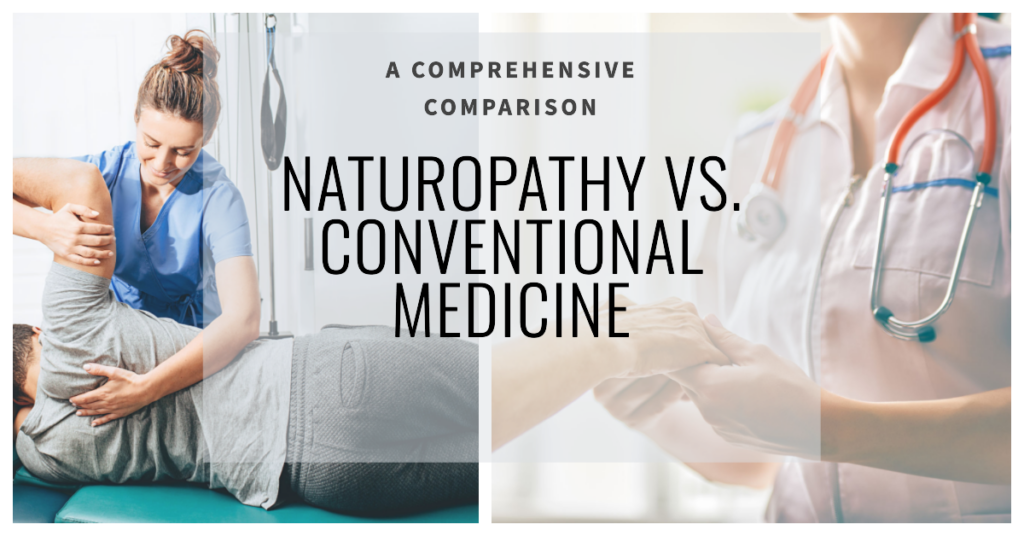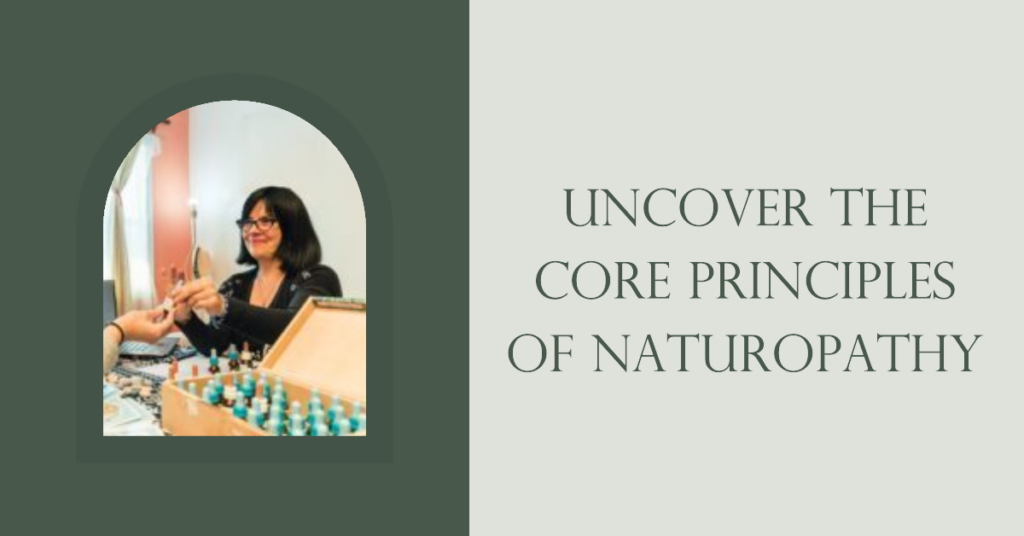The Art of Integrating Naturopathy and Conventional Medicine

Naturopathy, or naturopathic medicine, is a holistic approach to healthcare that seeks to use the body’s natural healing power to prevent, diagnose, and treat diseases. Integrating naturopathy with conventional medicine has the potential to provide a well-rounded approach to managing various health issues and improving overall well-being. In this article, we will explore what naturopathy is, why it is essential to integrate it with conventional medicine, and the benefits and challenges of doing so.
Understanding Naturopathy and Conventional Medicine
Core Principles of Naturopathy
Naturopathy focuses on maintaining and optimizing the body’s inherent ability to heal itself. It is guided by several core principles, which include treating the root cause of illness, treating the whole person, disease prevention, and promoting wellness. Naturopathic doctors use a variety of natural therapies, such as herbal medicine, dietary changes, acupuncture, and homeopathy, to support the body’s healing processes.
Approaches in Conventional Medicine
Conventional medicine, also known as allopathic or Western medicine, is the healthcare system commonly practiced in most parts of the world. Doctors in this field focus on diagnosing and treating diseases using evidence-based science and technology. Conventional medicine primarily utilizes pharmaceutical drugs, surgery, and other medical interventions to manage symptoms and treat acute and chronic conditions.
Benefits of Integrating Naturopathy and Conventional Medicine
Alternative Options for Treatment
Integrating naturopathy and conventional medicine can offer patients a broader range of treatment options for different health problems. For instance, a person experiencing chronic pain may consider combining conventional pain management techniques with naturopathic therapies like acupuncture and herbal remedies, which may provide longer-lasting relief with fewer side effects.
Holistic Care
Combining naturopathic and conventional medicine approaches allows for a holistic view of a patient’s health. This means addressing not only the physical symptoms of a disease but also its emotional, mental, and even environmental aspects. By focusing on the whole person, healthcare practitioners can tailor treatment plans to meet each patient’s unique needs and circumstances.
Patient-Centered Care
Integrative healthcare empowers patients by encouraging active participation in their treatment plans and overall health. This approach fosters a partnership between healthcare providers and patients, where both parties work together to make informed decisions that align with the patient’s values and personal beliefs. A focus on patient-centered care helps ensure that treatment plans are tailored for the individual and address their specific health concerns and goals.
Challenges of Integration
Differences in Approaches
One of the primary challenges in integrating naturopathy and conventional medicine is the significant differences in treatment approaches and philosophies. While conventional medicine relies on evidence-based science and medical interventions, naturopathy emphasizes using the body’s innate healing power and natural therapies. These fundamental differences may sometimes make it difficult for practitioners from both fields to find common ground in treatment plans for their patients.
Acceptance among Medical Professionals
Although there is growing interest in integrating alternative healthcare approaches, some medical professionals remain skeptical about the effectiveness of naturopathic treatments. This skepticism can hinder effective collaboration between conventional and naturopathic healthcare providers. However, as research continues to emerge supporting the benefits of naturopathic therapies, their acceptance in mainstream medicine will likely grow.
Education and Awareness
For successful integration, both healthcare professionals and patients need to be informed about the principles and practices of naturopathy. Limited knowledge of naturopathic medicine among conventional healthcare providers and the general public can create misconceptions and impede effective collaboration. Increased education and awareness about naturopathy’s benefits will be crucial for its successful integration with conventional medicine.
Steps to Successful Integration
Collaboration between Practitioners
Establishing a collaborative relationship between naturopathic and conventional healthcare providers is essential for successful integration. By understanding each other’s approaches and acknowledging the value they offer, practitioners can work together to provide comprehensive healthcare for their patients. Developing this type of relationship requires open-mindedness and mutual respect from all parties involved.
Open Communication
Good communication between healthcare providers and patients is crucial when integrating naturopathy and conventional medicine. Conversations about treatment options should be open, honest, and guided by the patient’s goals and values. Practitioners should take the time to educate and inform their patients about the benefits and potential risks associated with different therapies, allowing patients to make informed decisions about their healthcare.
Patient Education and Empowerment
Effective integration of naturopathy and conventional medicine requires patients to be informed and empowered in their healthcare journey. This means providing patients with the knowledge and resources needed to make decisions about their treatment, understand their health condition, and actively participate in their care. By educating and supporting patients in this way, healthcare professionals can foster a healthier population and more effective healthcare system.
Integrative Health Care Models
Integrative Medicine Clinics
Integrative medicine clinics are healthcare facilities that combine conventional and naturopathic treatments under one roof, allowing patients to access a range of complementary therapies alongside standard medical care. This model fosters collaboration between practitioners and ensures a seamless transition for patients when moving between different treatment approaches.
Collaborative Care Teams
Another way to integrate naturopathy and conventional medicine is through collaborative care teams. These teams consist of practitioners from various healthcare disciplines, including conventional and naturopathic doctors, working together to provide comprehensive care for their patients. This model encourages cooperation and communication between providers and allows for personalized treatment plans that address each patient’s unique needs.
Naturopathic Treatments as Complements to Conventional Medicine
Naturopathic therapies can complement conventional medicine in various ways, such as supporting overall wellness, reducing side effects from conventional treatments, and promoting long-term health. Some examples of naturopathic treatments that can be integrated into conventional care include:
- Dietary interventions: Naturopaths often use individualized dietary recommendations to help patients improve their health. These dietary changes can be used alongside conventional treatments to enhance their effectiveness and support overall well-being.
- Herbal medicine: Herbs can be used to manage symptoms and support the body’s natural healing processes. When used appropriately, herbal remedies may enhance the benefits of conventional treatments while minimizing potential side effects.
- Acupuncture: Acupuncture is a traditional Chinese medicine therapy that can be used to manage pain, reduce stress, and improve overall health. It can be a valuable addition to conventional medical treatments, providing relief from symptoms and promoting general well-being.
- Homeopathy: Although controversial, some patients choose homeopathic remedies to complement their conventional medical treatments. Homeopathy may help reduce side effects from conventional medications and provide additional support for the body’s healing processes.
Benefits of Integrating Mental Health into Primary Care
Mental health is a crucial aspect of overall well-being, and addressing psychological concerns in conjunction with physical ailments can lead to better healthcare outcomes. Research by the World Health Organization (WHO) demonstrates that integrating mental health services into primary care can make mental healthcare more accessible, reduce stigma, and promote early detection and treatment of mental health issues. Combining naturopathic medicine’s focus on holistic health with conventional methodologies can promote integrated care solutions for both mental and physical health concerns.
Exploring the Impact of Nutrition on Health
Nutrition plays a significant role in maintaining optimal health, preventing chronic diseases, and managing existing health issues. The Harvard T.H. Chan School of Public Health has conducted extensive research on the impact of diet on immune function, mental health, and other aspects of overall well-being, emphasizing the importance of a balanced and varied diet. Naturopathic medicine often entails dietary interventions based on individual needs, making it a valuable addition to conventional healthcare for addressing various health concerns and promoting long-term well-being.
Naturopathy for Women’s Health
Naturopathic medicine can be especially beneficial for women’s health issues. Some of the areas in which naturopathy can support women’s health include:
- Fertility and pregnancy support: Naturopaths can provide guidance on nutrition, supplements, and lifestyle changes to promote fertility and support a healthy pregnancy.
- Menopause management: By using natural therapies such as herbal medicine, dietary interventions, and stress management techniques, naturopaths can help women manage symptoms of menopause and enhance overall well-being during this transitional phase of life.
The Role of Naturopathic Doctors
Naturopathic doctors play a vital role in the integration of naturopathy and conventional medicine. They undergo extensive education and training in both medical and naturopathic disciplines, ensuring they understand their patients’ needs and can work effectively alongside other healthcare providers. As part of an integrative healthcare model, naturopathic doctors can provide valuable expertise and guidance to support their patients’ overall health and well-being.
Patient Education and Informed Decision-Making
For the successful integration of naturopathy and conventional medicine, patient education is essential. Healthcare providers should encourage their patients to learn about different treatment options and make informed decisions about their care. By empowering patients to take control of their health and well-being, healthcare practitioners can promote long-term wellness and improved healthcare outcomes.
The Future of Integrated Healthcare
As interest in holistic healthcare continues to grow, we can expect to see more integration of naturopathy and conventional medicine in the future. By combining the best of both worlds, patients can benefit from a comprehensive approach to healthcare that addresses their unique needs and promotes overall well-being.
Conclusion
Integrating naturopathy and conventional medicine has the potential to transform healthcare and improve patient outcomes. By combining the best of both systems, healthcare providers can offer a comprehensive approach to treating disease and promoting long-term wellness. Through collaboration, education, and open communication, integrative healthcare models can provide patients with the support they need to achieve optimal health and well-being.
Frequently Asked Questions
- What is the difference between naturopathy and conventional medicine?
Naturopathy is a holistic healthcare approach that seeks to utilize the body’s natural healing power, while conventional medicine is based on evidence-based science and employs medical interventions such as pharmaceutical drugs and surgery. - How can naturopathy complement conventional medical treatments?
Naturopathic therapies can support overall wellness, reduce side effects from conventional treatments, and promote long-term health. - What are some examples of naturopathic treatments?
Examples include dietary interventions, herbal medicine, acupuncture, and homeopathy. - How can I find a naturopathic doctor to work with my conventional medical team?
Look for a naturopathic doctor who has experience working in integrative healthcare settings and is open to collaborating with other healthcare providers. - What is the role of patient education in integrative healthcare?
Patient education is essential for empowering patients to take control of their health, make informed decisions about their care, and understand the benefits and potential risks of different therapies.










I totally believe in the holistic approach to health care. As an RN, I have witnessed shortcomings in Western medicine where issues were dismissed because they weren’t covered in a physician’s specialty. Had the doctor been willing to consider the patient as a whole, it wouldn’t have taken so long to help that person and secondary health issues could have potentially been avoided.
Utilizing an approach that treats, the whole mind body spirit is much more effective. and is well known that food as medicine.
It is good know that Naturopathy is a holistic approach to healthcare that seeks to use the body’s natural healing power to prevent, diagnose, and treat diseases. I
[…] from their bodies and health, a key role of a naturopathic practitioner is to empower clients to reclaim control over their well-being. This aspect of the job can be immensely satisfying for many […]